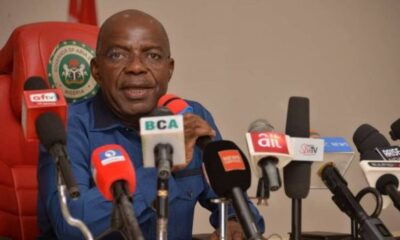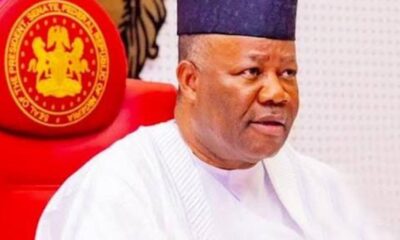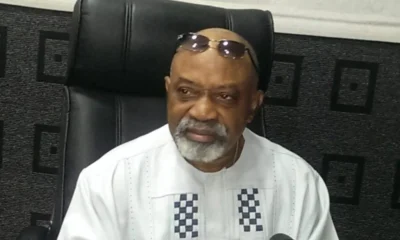Politics
INEC to phase out PVCs, plans Diaspora voting INEC Chairman, Mahmood Yakubu
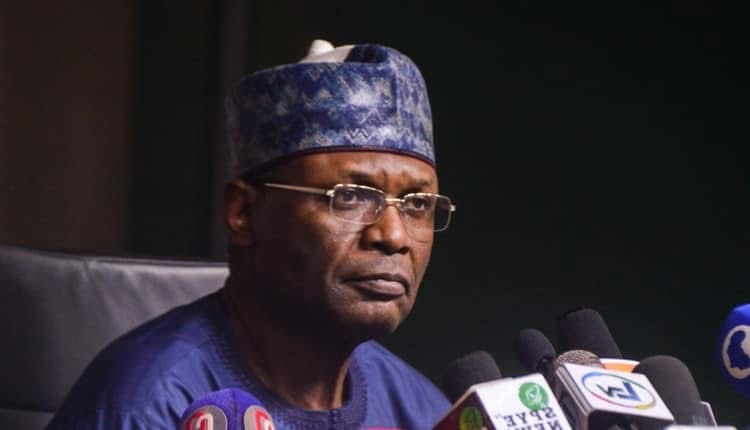
The Independent National Electoral Commission has proposed sweeping reforms to improve the country’s electoral system, following lessons learnt from the 2023 general elections and subsequent off-cycle polls.
Among the reforms being proposed are diaspora voting and phasing out of the use of Permanent Voter Card during elections.
The INEC Chairman, Prof, Mahmood Yakubu, disclosed these on Thursday in Abuja during a meeting with Resident Electoral Commissioners.
He stated that INEC would soon present these proposals and more to the relevant committees in the Senate and House of Representatives.
He said, “Among the major highlights of the commission’s recommendations is the imperative of legal clarity in result management, with regard to manual transfer versus the electronic transmission of results.
“The commission also believes that with the introduction of the Bimodal Voter Accreditation System, the use of the Permanent Voters’ Cards as the sole means of identification for voter accreditation on election day should be reviewed. Those who already have the PVCs can still use them to vote, but going forward, computer-generated slips issued to the voter or even downloaded from the commission’s website will suffice for voter accreditation.
“This will not only save cost, it will also eliminate the issues around the collection of PVCs and the diabolical practice of buying up the cards from voters in order to disenfranchise them.
There are also recommendations in support of diaspora voting, the unbundling of the commission with the establishment of electoral offences tribunal and a separate agency to handle the registration and regulation of political parties.
“Similarly, the commission will step up action on voter access and distribution to polling units.”
INEC Chairman explained that these recommendations were captured in a 524-page review report on the 2023 general elections
He said, “With the conclusion of five major off-cycle governorship elections and nine out of 21 bye-elections since the 2023 general elections, this is the most appropriate time for us to commence the implementation of the recommendations arising from our review of the general elections.
“From the internal and external engagements, the commission has identified 142 recommendations dealing with the general state of preparedness, voter management, voter education and public communication, political parties and candidate management, electoral operations and logistics management, election officials and personnel, partnership and collaboration, monitoring and supervision, election technology, voting and result management, election security, electoral offences and the electoral legal framework,” the chairman said.
Of these, 86 require administrative action by the commission, 48 depend on collaboration with stakeholders such as security agencies and civil society organizations, and eight involve legislative amendments by the National Assembly.
Yakubu noted, “Out of the 142 recommendations, 86 require administrative action by the commission. It is therefore pertinent that we engage first with our Resident Electoral Commissioners because of your frontline role in the implementation of the recommendations.
This is followed by 48 recommendations that require action by a variety of stakeholders, including security agencies, mobile network operators, statutory bodies, political parties, transport unions, civil society organisations and the media.
“On the legal review, there are eight recommendations that require legislative action by the National Assembly. Very soon, the commission will make a presentation to the Joint Committee of the Senate and House of Representatives on Electoral Matters as they continue to deliberate on electoral reform.”
Central to the proposed reforms is a push for legal clarity on result transmission, specifically the roles of manual and electronic methods.
Yakubu noted that the introduction of the Bimodal Voter Accreditation System has highlighted the need for a more streamlined process.
He suggested the possibility of replacing Permanent Voter Cards with computer-generated slips or downloadable credentials for voter accreditation, a move aimed at reducing costs and eliminating voter card-buying schemes.
Yakubu also revealed plans to introduce early and diaspora voting to accommodate citizens unable to vote at their registered polling units, including INEC staff, security personnel, and Nigerians living abroad.
Additionally, INEC is advocating the unbundling of its responsibilities, with proposals for the establishment of an electoral offences tribunal and a separate agency to oversee political party registration and regulation.
Other key areas of reform include cleaning the voters’ register in collaboration with the National Identity Management Commission and enhancing partnerships with transport unions to ensure the timely deployment of election materials.
The commission also plans to intensify voter education campaigns to combat misinformation and promote greater participation by marginalised groups.
“As a matter of urgency, the commission also intends to develop protocols for the cleaning up of the voters’ register in collaboration with other agencies such as the National Identity Management Commission and the National Population Commission. Other areas of reform include advocacy for affirmative action for greater participation of under-represented groups, a more robust voter education and public communication to combat fake news and misinformation,” Yakubu stated.
The recommendations, documented in a comprehensive report, will soon be made available to the public in hard and soft copies.
Yakubu urged the RECs to engage deeply with the report and contribute to the development of a more efficient and inclusive electoral system.
Politics
Ndigbo are no longer spectators in the Nigerian project- Minister Dave Umahi dismisses calls for Biafra under Tinubu’s administration

The Minister of Works, David Umahi, says the all-inclusive style of governance being practiced by President Bola Tinubu has made the agitation for Biafra an unnecessary clamour.
While speaking at the inspection of the Enugu-Anambra road last Saturday, December 13, Umahi said the Tinubu administration had given Ndigbo what they had sought for decades, not through secession, but through what he described as unprecedented inclusion in national governance and development.
He explained that the agitation for Biafra was historically driven by neglect, exclusion and underrepresentation at the federal level, but insisted that the situation had changed under the current administration.
“When a people are fully integrated, respected and empowered within the structure of the nation, the dream they once chased through agitation has already been achieved through cooperation.
The push for Biafran secession over the years was borne out of neglect, exclusion and underrepresentation but today the narrative has changed dramatically under President Bola Tinubu.
The President has deliberately opened the doors of national development to the South-East. Appointments, policy inputs and infrastructure priorities now reflect true federal balance.
Every sector now bears visible Igbo footprints. The emergence of Igbo sons and daughters in strategic positions is a testament to this inclusion.
Biafra was never about breaking Nigeria; it was about being counted in Nigeria. Through inclusion, equity and concrete development, Ndigbo are no longer spectators in the Nigerian project; they are co-authors of its future. When justice finds a people, agitation loses its voice.”he said
Politics
ADC Launches 90-Day Membership Drive, Fixes Dates For Congresses, National Convention
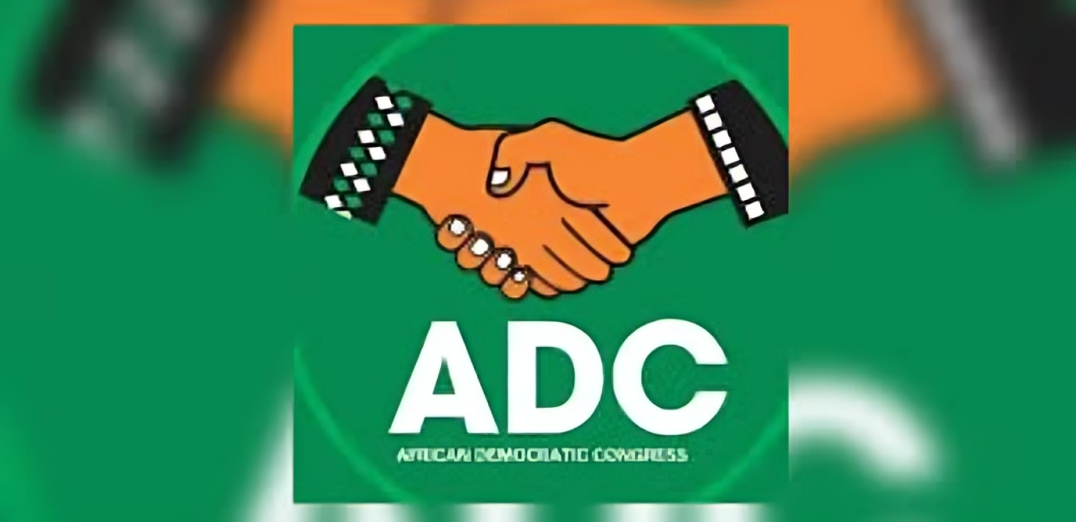
The African Democratic Congress (ADC) has announced a 90-day nationwide membership mobilisation, revalidation, and registration exercise as part of preparations for its internal party activities ahead of 2026.
The party also approved provisional dates for its congresses and the election of delegates at the polling unit, ward, and local government levels across the country.
In circulars issued by its national secretary, Rauf Aregbesola, the ADC said the congresses are expected to hold between January 20 and January 27, 2026.
The process, the party said, will lead to the emergence of delegates who will participate in its non-elective national convention scheduled for February 2026 in Abuja.
A statement by Bolaji Abdullahi, national publicity secretary of the party, said the decisions were reached at a meeting of the national working committee (NWC) held on November 27, 2025.
Abdullahi said the timetable and activities were approved in line with the resolutions of the NWC and in accordance with relevant provisions of the party’s constitution.
The ADC said further details on the membership exercise, congresses, and convention will be communicated to party members and stakeholders in due course.
Politics
INVESTIGATION: Why No Imo Governor Ever Controls Succession- The Untold Story
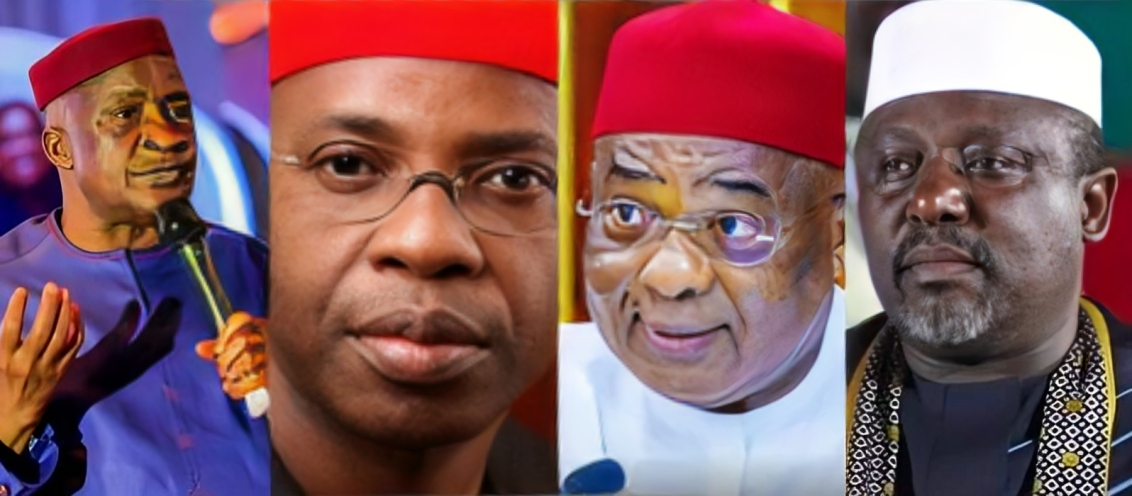
Imo State’s inability to sustain political succession from one elected governor to another is not accidental. It is the consequence of recurring structural failures rooted in elite conspiracy, federal power realignments, internal party implosions, zoning sensitivities, and the perennial arrogance of incumbency. From Achike Udenwa to Ikedi Ohakim and Rochas Okorocha, each administration fell victim to a combination of these forces, leaving behind a state where power is never inherited, only contested.
Achike Udenwa’s experience remains the most instructive example of how federal might and elite scheming can dismantle a governor’s succession plan. Governing between 1999 and 2007 under the PDP, Udenwa assumed that the party’s national dominance would guarantee internal cohesion in Imo. Instead, his tenure coincided with one of the most vicious intra-party wars the state has ever witnessed.
The Imo PDP split into two irreconcilable blocs. On one side was Udenwa’s grassroots-driven Onongono Group, powered by loyalists such as Alex Obi and anchored on local structures. On the other was a formidable Abuja faction populated by heavyweight figures including Kema Chikwe, Ifeanyi Araraume, Hope Uzodimma, Tony Ezenna, and others with direct access to federal influence. This was not a clash of personalities alone; it was a struggle over who controlled the levers of power beyond Owerri.
The conflict worsened when Udenwa openly aligned with then Vice President Atiku Abubakar during his bitter feud with President Olusegun Obasanjo. That alignment proved politically fatal. Obasanjo, determined to weaken Atiku’s network nationwide, withdrew federal support from governors perceived as loyal to the vice president. In Imo, the effect was immediate and devastating.
Federal agencies, party organs, and influence channels tilted decisively toward the Kema Chikwe-led Abuja faction. Udenwa lost effective control of the PDP structure, security leverage, and strategic influence. His foot soldiers in the Onongono Group could mobilise locally, but they could not withstand a coordinated assault backed by the centre.
His preferred successor, Charles Ugwu, never gained political altitude. By the time succession became imminent, Udenwa was already a governor without power. Even his later recalculations failed to reverse the tide. The party had slipped beyond his grasp.
The eventual outcome was politically ironic. Ikedi Ohakim emerged governor, backed by forces aligned with the federal establishment, notably Maurice Iwu—his kinsman and then Chairman of the Independent National Electoral Commission (INEC). Another Udenwa ally, Martin Agbaso, briefly tasted victory, only for his election to be cancelled. The lesson was brutal and unmistakable: without federal alignment, succession in Imo is almost impossible.
Notably, Udenwa’s record in office did not rescue him. Infrastructure development, relative stability, and administrative competence counted for little in the face of elite conspiracy operating simultaneously at state and federal levels. In Imo politics, performance is secondary to power alignment.
Ikedi Ohakim’s tenure presents a different dimension of failure. Unlike Udenwa, he never reached the point of succession planning. His administration was consumed by political survival. From 2007 to 2011, Ohakim governed amid persistent hostility from elites and a rapidly deteriorating public image.
Ohakim has consistently maintained that his downfall was orchestrated. Central to his claim is the allegation that he was blackmailed with a scandal involving the alleged assault of a Catholic priest, Reverend Father Eustace Eke. In a deeply religious state like Imo, the allegation was politically lethal.
Whether the claims were factual or exaggerated mattered less than their impact. The narrative overwhelmed governance, drowned out policy achievements, and turned public opinion sharply against him. Political elites who had midwifed his emergence quickly distanced themselves, sensing vulnerability.
By the 2011 election, Ohakim stood isolated. Party loyalty evaporated, elite cover disappeared, and voter sympathy collapsed. His re-election bid failed decisively. With that loss, any discussion of succession became irrelevant. His experience reinforces a core principle: a governor rejected by the electorate cannot dictate continuity.

*Uzodimma*
Rochas Okorocha’s rise in 2011 appeared to signal a break from Imo’s succession curse. Charismatic, populist, and financially powerful, he commanded party structures and grassroots loyalty. By his second term, he seemed politically unassailable.
Yet Okorocha committed the most consequential succession error in the state’s history. By attempting to impose his son-in-law, Uche Nwosu, as successor, he crossed from political strategy into dynastic ambition. That decision detonated his massive support base in the State overnight.
Imo’s political elites revolted almost unanimously. Party affiliation became secondary to a shared determination to stop what was widely perceived as an attempt to privatise public office. The revolt was elite-driven, strategic, and ruthless.
The zoning factor compounded the crisis. Okorocha hailed from Orlu zone; so did Nwosu. For many Imo voters, the prospect of Orlu retaining power through familial succession was unacceptable. What might have been tolerated as ambition became framed as entitlement.
This time, elite resistance aligned with popular sentiment. The electorate queued behind alternatives not necessarily out of conviction, but out of rejection. Crucially, Emeka Ihedioha emerged governor because Okorocha fatally miscalculated—splitting his base, provoking elite rebellion, and underestimating voter resentment. Okorocha’s formidable structure collapsed under internal rebellion and voter backlash, sealing his failure to produce a successor.
Hope Uzodimma’s current position must be assessed against this turbulent history. At present, the structural indicators are in his favour. He enjoys firm federal backing, controls the APC machinery in the state, and commands the support—or at least the compliance—of most major political elites.
Unlike Udenwa, Uzodimma is aligned with the centre. Unlike Ohakim, he has survived electoral tests. Unlike Okorocha, he has not openly flirted with dynastic politics. On the surface, the succession equation appears favorable.
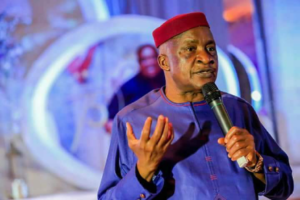
*Udenwa*
However, Imo’s history cautions against certainty. Elite loyalty in the state is conditional and transactional. It endures only where interests are balanced, ambitions managed, and inclusion sustained. A wrong choice of successor could still provoke elite conspiracy, even if it emerges from within the ruling party.
The opposition remains weak and fragmented, with limited capacity to mobilize mass resistance. Yet voter apathy, now more pronounced than during the Udenwa and Okorocha eras, introduces a new risk. Disengaged electorates are unpredictable and often disruptive.
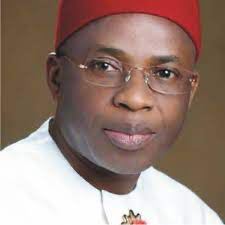
“Ohakim*
Ultimately, Uzodimma’s challenge is not opposition strength but elite psychology. Suppressed ambitions, if mishandled, can erupt. Succession in Imo has never been about coronation; it is about negotiation.

*Okorocha*
History is unforgiving to governors who confuse incumbency with ownership. Power in Imo is never transferred by decree. As 2027 approaches, the same forces that toppled past succession plans remain alive. Whether Uzodimma avoids their trap will depend not on power alone, but on restraint, balance, and political wisdom.
-
Business1 year ago
US court acquits Air Peace boss, slams Mayfield $4000 fine
-

 Trending1 year ago
Trending1 year agoNYA demands release of ‘abducted’ Imo chairman, preaches good governance
-

 Politics1 year ago
Politics1 year agoMexico’s new president causes concern just weeks before the US elections
-

 Politics1 year ago
Politics1 year agoPutin invites 20 world leaders
-

 Politics1 year ago
Politics1 year agoRussia bans imports of agro-products from Kazakhstan after refusal to join BRICS
-
Entertainment1 year ago
Bobrisky falls ill in police custody, rushed to hospital
-
Entertainment1 year ago
Bobrisky transferred from Immigration to FCID, spends night behind bars
-
Education1 year ago
GOVERNOR FUBARA APPOINTS COUNCIL MEMBERS FOR KEN SARO-WIWA POLYTECHNIC BORI

